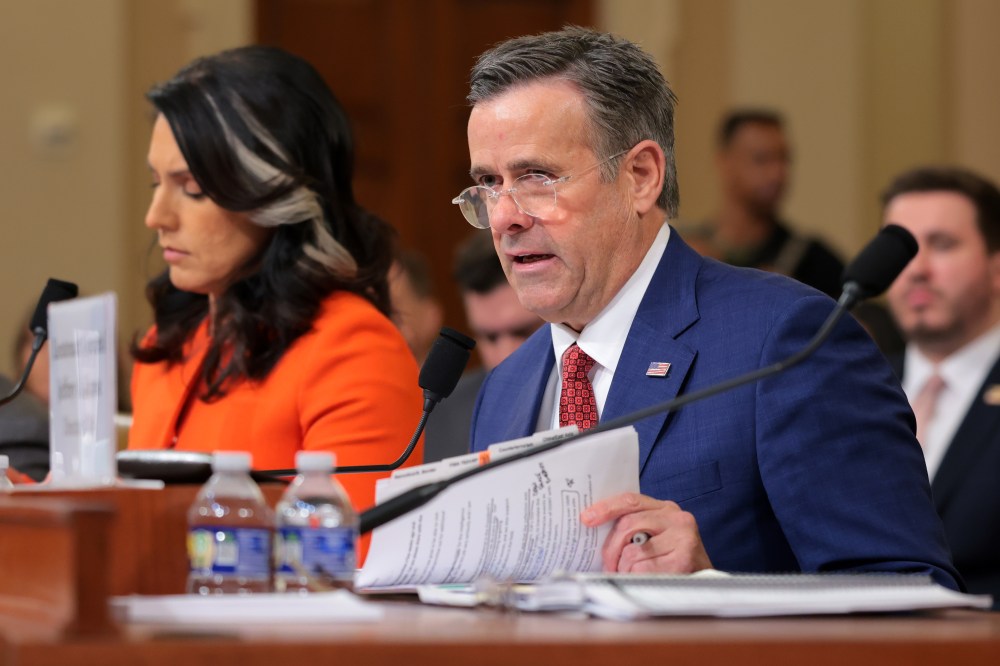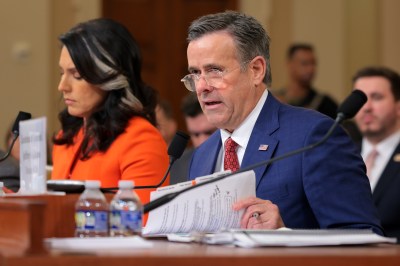Hello and happy Saturday. We spend a fair amount of time here at The Dispatch thinking about headlines. After all, everything we publish needs one. You want to inform the readers, but also invite them to keep reading. Some pieces benefit from playing it straight, others provide the opportunity for wordplay.
I don’t know if I’ve ever seen a headline that was at once as straightforward and startling as the one published in The Atlantic on Monday: “The Trump Administration Accidentally Texted Me Its War Plans.” As you no doubt have heard by now, National Security Adviser Mike Waltz inadvertently added Atlantic editor Jeffrey Goldberg to a group chat on Signal, a text messaging app, with Defense Secretary Pete Hegseth, Vice President J.D. Vance, Secretary of State Marco Rubio, and other members of President Donald Trump’s national security team. And that is how Goldberg found himself sitting in a supermarket parking lot on March 15, reading texts claiming that the U.S. was about to launch airstrikes on Houthi terrorist targets in Yemen, only to go to X and find reports of explosions in Sanaa, the nation’s capital.
There’s a lot to unpack about the whole incident. The vice president and key Cabinet officials demonstrated utter disregard for security protocol by conducting their conversation over a commercial app that anyone can use. And while Goldberg refrained, initially, from sharing any of the texts that contained operationally sensitive information (only publishing them after the administration denied his assertion that the chat included classified information), what he did share will have repercussions for the United States on the world stage.
Vance, expressing some hesitation about the airstrikes and suggesting a month’s delay, said, “If you think we should do it let’s go. I just hate bailing Europe out again.” That prompted Hegseth to reply, “VP: I fully share your loathing of European free-loading. It’s PATHETIC.”
In the Wednesday G-File (🔒), Jonah Goldberg (who is not only not Jeffrey Goldberg, but not related to him at all) argued that the open disdain for our allies “will reverberate for decades to come.” While Vance’s scorn for Europe is on the record—he delivered a speech from the Munich Security Conference scolding European leaders for how their countries have been handling immigration, free speech, and religious liberty—Jonah pointed out that “Trump and his surrogates don’t always mean what they say.” But now the truth is out there.
Imagine you’re a pro-American foreign minister or parliamentarian who has been reluctant to give up on America or side with anti-American domestic factions. This chat makes it clear, at minimum, that it would be foolish to rely on America. Even if you think, as Keir Starmer, Emmanuel Macron and others do, that they can play nice for the duration of the Trump administration and then work to repair relations once he’s out of office, the fact that America will remain just one election away from this kind of administration means, strategically, America is unreliable over the long term.
In Boiling Frogs (🔒), Nick Catoggio critiqued the administration’s response and warned that the scandal is just a preview of what’s to come.
Trump’s second administration will be an orgy of foreign espionage. It’s staffed to the gills with lackwit toadies, sociopathic grifters, and authoritarian ideologues and so, for the next four years, U.S. intelligence will be profligately stolen, sold, or incompetently fumbled away. And that’s just the illegal stuff. The legal stuff is also dismaying: Elon Musk’s operation is seizing treasure troves of federal data, federal cybersecurity experts are being fired willy-nilly, the Justice Department has disbanded its Foreign Influence Task Force, and the president and some of his most trusted deputies keep sounding like Russian agents.
For now, no one in the administration has been fired for the security breach. But Charles Hilu reported Friday that some Republican lawmakers are challenging the administration to be more forthcoming. GOP Sen. Roger Wicker, for example, told reporters he wanted the administration to provide a classified briefing—in a secure location!—about what happened. Other Republicans aren’t buying the claim that the information was not classified. “They’re playing word games,” GOP Rep. Don Bacon of Nebraska said. “They’re digging a hole, and they’re hurting their own credibility.”
If you need a little counterprogramming, we had some great pieces this week. Alex Demas wrote an in-depth feature on the rise of D.C.’s craft cocktail scene (insert jokes about drinking on the job here), contributing writer Jeremiah Johnson had some advice for Democrats, and fellow contributing writer Tim Mak explored the thorny ethics of making drones more autonomous. Thanks for reading, and have a great weekend.
Deke Dunne doesn’t look like a Hill staffer, at least not anymore. His frosted quiff and thin line tattoos would immediately set him apart in Washington’s conservatively dressed halls of power. But before he ran one of the District’s most singular cocktail experiences, Dunne worked in congressional offices in D.C. and on the campaign trail in Wyoming. After the 2016 election, however, Dunne’s passion for politics waned. Two years prior—half to escape the stultifying culture of his peers on Capitol Hill and half to supplement his meager congressional salary—Dunne began picking up weekend shifts at Wonderland Ballroom, a Columbia Heights dive. The experience scratched a creative itch that politics couldn’t and, by June 2017, when Drink Company launched its Game of Thrones pop-up, Dunne jumped on an offer to work security. Within a month, he was behind the bar.
Democrats didn’t lose in 2024 because they needed to do more outreach to disadvantaged communities or interest groups. Nor were they a few podcast appearances or viral stunts away from victory. They lost because voters could tell that over the course of several years, the party drifted far out of line with the public on a number of highly salient issues. Democrats became the party of nags, aggressively scolding anyone who didn’t speak the correct woke parlance. Joe Biden presided over a genuine border crisis and a broken asylum system that he was far too slow to address. Movements like Defund the Police and the pro-Palestine campus protests originated from the far left, leaving even moderate Democrats associated with policies that were deeply unpopular with voters. And, in the midst of trying to defend losing cultural positions, the biggest Democratic-run cities and states were often poorly governed, suffering from pervasive homelessness, public disorder, and untenable costs of living.
Over a few short years, small drones have morphed from playthings—meant for wedding photography and weekend hobbyists—to deadly weapons of war, dozens of which can be coordinated for maximum effect. In fact, drones have become the defining weapon of the war in Ukraine, allowing a country with a meager air force, few missiles, and a scant navy to hit targets far beyond the frontlines. Mathematician’s unit, part of the Khartiia Brigade station in the northeast corner of Ukraine, is engaged in some of the most cutting-edge drone innovation in the world. In December, the brigade pulled off the first ever air- and ground-drone assault on a Russian position.
Best of the Rest
The Divide on the Right Over the Alien Enemies Act
Legal thinkers advise caution on denying due process, while GOP lawmakers go along with the Trump administration.
A New Exodus
What elite colleges will lose if Orthodox Jews go elsewhere.
A Confessing Church for America’s Weimar Moment
Plus: A century of Flannery O’Connor.
Javier Milei and the Legitimacy of Libertarian Policy
He has put one of the world’s true economic basket cases on the path toward fiscal sustainability.
Stumped By Stumpage
Canadians stand accused of ... subsidizing hundreds of millions of Americans.
Laughing on the Right
How comedians, podcasters, and internet trolls helped Donald Trump retake the White House.
Betrayal of the Law Firms
‘This was an existential threat to the firm.’
National Security Used To Be a Thing
‘I reserve the right to be Jeff Goldberg.’


















Please note that we at The Dispatch hold ourselves, our work, and our commenters to a higher standard than other places on the internet. We welcome comments that foster genuine debate or discussion—including comments critical of us or our work—but responses that include ad hominem attacks on fellow Dispatch members or are intended to stoke fear and anger may be moderated.
With your membership, you only have the ability to comment on The Morning Dispatch articles. Consider upgrading to join the conversation everywhere.